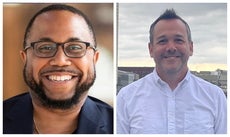
Viewpoint: Lessons to learn from Europe's smarter justice system
In May and June 2025, a delegation of Massachusetts-based reentry practitioners, nonprofit leaders, elected officials, and public safety professionals traveled to Germany, Sweden, and Norway to study firsthand how European justice systems approach incarceration and reentry. What we witnessed were systems rooted in dignity, restoration, and long-term public safety. These models offer compelling insights for reform efforts back home.

In Germany, we were struck by a fundamental structural difference: prisons are run by social workers, with correctional officers reporting to them. This inversion of hierarchy reinforces the mission of rehabilitation over punishment. The open prison model, as seen at Spandau, provides state-sponsored housing that removes one of the major social determinants of recidivism. Individuals nearing release live in apartment-style settings. Families can visit inside the facility, and individuals are permitted to visit their families outside. This reestablishes bonds and responsibilities well before reentry. The system functions on normalization, and the absence of a punitive culture leads to low recidivism and healthier communities.
In Sweden, we encountered a justice system that proactively reduces incarceration through robust probation and early interventions. Skyddsvärnet, a nonprofit halfway house, exemplified this by offering dignified reentry housing and wraparound supports. One of Sweden’s most innovative models is its universal foster care system. Any individual, regardless of age, can be taken in by a foster family. For returning citizens, this means the possibility of being welcomed into a home and community setting, fulfilling the need for connection while reducing isolation and housing insecurity. The result is a more humane and effective transition into society.
In Norway, we saw reentry services integrated into everyday community life via a bicycle repair shop, a café, and robust prison in-reach programs at the Red Cross in Oslo. Their model is being replicated internationally, with delegations from Japan and Eastern Europe learning from their example. On Bastøy Island, we witnessed what many call the world’s most humane prison. Incarcerated individuals farm, run a grocery store, care for animals, and staff a ferry where they earn real employment certifications. The environment, responsibility, and autonomy create a culture of growth rather than confinement.
Each of these three systems treats people as human beings first and justice-involved individuals second. They operate with the understanding that safer neighborhoods are built not through harsh sentences but through evidence-based practices, community integration, and a commitment to successful reentry.
Back in Massachusetts, we see these principles reflected in the B.R.A.V.E. Unit at North Central Correctional Institution. BRAVE, which stands for Building Responsible Adults through Validation and Education, is a residential program for incarcerated fathers aged 18 to 26. The program brings together young men with mentors who live in the unit and engage in parenting classes, life skills training, cooking, laundry, and structured family visits in a space designed for real interaction. One participant shared, “I’m not just living for myself no more. I’m living for my kids.” Another described holding his daughter for the first time in a room filled with children’s books, board games, and a tea set. The program has served dozens of men and now includes a yearlong coding class through a partnership with Persevere, helping participants earn in-demand tech certifications.
Doing reentry well is not just a moral imperative. It is also a smart economic strategy. When people return home with housing, jobs, support, and dignity, they are far less likely to return to incarceration. This reduces the burden on taxpayers, lowers public safety costs, and strengthens the local workforce. Communities benefit from lower crime rates, reunited families, and increased civic participation. Investing in reentry is ultimately an investment in public well-being and economic stability.
Massachusetts has made significant strides in criminal justice reform over the past decade. Still, the path forward requires bold thinking. Opportunities like the Clean Slate Bill and Compassionate Release legislation offer critical next steps. If cities like Philadelphia can create “Little Scandinavia” units within their correctional systems, there is no reason Massachusetts cannot do the same.
In 2026, we look forward to hosting a Swedish delegation here in greater Worcester. They will visit the Dismas Family Farm and Legendary Legacies, two local programs rooted in the same principles of dignity, healing, and reintegration.
The lessons are clear. With imagination, courage, and a willingness to lead, we can build justice systems that truly serve public safety, reduce costs, and uplift entire communities.
Ronald Waddell is the co-founder and executive director of Worcester nonprofit Legendary Legacies. Dave McMahon is co-executive director of Worcester nonprofit Dismas House of Massachusetts.








0 Comments